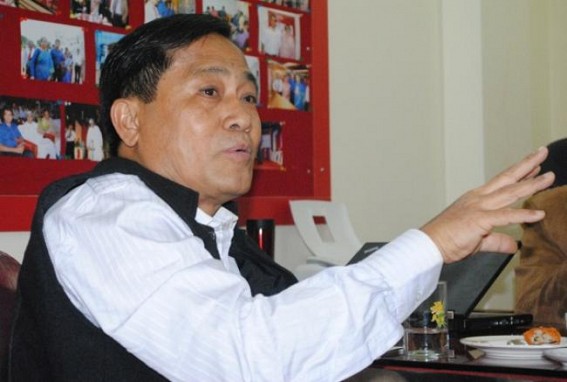TIWN

AGARTALA, January 6 (TIWN): Stressing upon a solution to the problem of sharing the Teesta water, Jiten Chowdhury said the Bangladesh govt. has done a lot in regard of better transportation system with neighbouring India. “the Monamohan Singh govt. failed to resolve the Teesta river water sharing issueâ€, said Chowdhury. Due to UPA Govt failure, Bangladesh Govt led by Sheikh Hasina couldn't proceed politically to grant permanent transit access via Bangladesh to rest of India.Sharing of Teesta river waters has been one issue that has always raised a debacle. Prime Minister Manmohan Singh expressed hope for the early conclusion of the Teesta water agreement at the BIMSTEC Summit in March 2014. While the Bangladeshi government has flagged its concern over the sharp decline of the waters, the government of West Bengal has expressed grave displeasure in having to share the already reduced flow which would further inhibit the prevailing hydro deficit situation of its northern region. But the UPA – II govt. had failed to take the issue into a right track, said Tripura MP Jiten Chowdhuryduring an exclusive talk with TIWN.
Jiten Chowdhury keeping hope on the present Modi govt. said that the Bangladesh govt. has always been extending their helping hand towards India and especially to Tripura.
Recently the Bangladesh govt. had given access to their port for transportation of the heavy materials and turbines in Palatana under the South District of Tripura, said Jitendra Chowdhury. He said that the Bangladesh govt. has been always requesting the India govt. to give its river and in return the Bangladesh is always ready to give their every product.
“Therefore it’s a turn for the govt. of India now to take a stock of the situation and resolve the Teesta river water sharing issue”, said Chowdhury.
However, arriving at an acceptable solution requires caution as the Teesta has proved to be a political landmine in the past. The Teesta is the fourth largest river in South Asia and due to its geographical profile, has multiple stakeholders. It originates in Sikkim, flows through West Bengal and then enters Bangladesh. The main problem arises because of seasonal variations in its flows. It is estimated that the Teesta River has a mean annual flow of 60 billion cubic metres but a significant amount of this water flows only during wet season i.e. between June and September, leaving scant flow during the dry season i.e. October to April/May wherein the average flow gets reduced to about 500 million cubic metres (MCM) per month. This creates issues of equitable sharing during lean season.
Keeping these concerns in mind, the Indian government and Sheikh Hasina's regime were poised to sign an agreement in 2013. This agreement, negotiated over a period of 18 years, allowed for a 50-50 allocation of the Teesta between the two countries during lean season, leaving aside 20% of the total flow of the river as environmental flow. But the water deal could not be ratified after the UPA government caved into last-minute opposition raised by West Bengal's Chief Minister Mamata Bannerjee. This was based on claims that an equal water-sharing arrangement between the two countries would be 'unfair' to West Bengal as it would adversely impact the water-flow available in the state.
The new NDA regime clearly has its work cut out for itself. It will have to foment consensus for equal sharing of the Teesta with all stakeholders in West Bengal. This government is definitely better placed to achieve this due to the comfortable majority it has garnered in the 2014 Lok Sabha elections, which makes it less vulnerable to coalition pressures than its predecessor.
But, at the same time, it is also crucial that a mutually acceptable solution to the Teesta need to be reached, without reversing the progress achieved by the previous regime vis-a-vis Bangladesh in areas of land border agreement, security and trade. It is vital to balance the demands of the state with the country's bilateral commitment to Bangladesh and therein lies the real diplomatic challenge for the Modi government.
- 'Intolerable.....' Corporators Lodged FIR against Madhabi Biswas over 'Insane Video' on social media targeting PM & Mayor
- Blood Donation Camp Organized in Sipahijala District
- Yuvrajnagar Panchayat Samiti Chairperson's Husband Denies Molestation Allegations
- CPIM Submits Memorandum for Fair Voter List Revision
- 23 Panchayats in Gauranagar Block Receive Computers, Printers, and LED TVs



